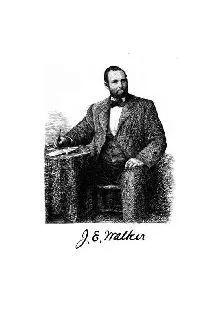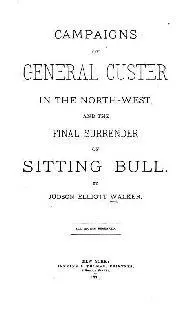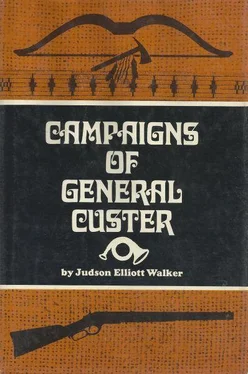Walker Array - Campaigns of General Custer in the North-west, and the final surrender of Sitting Bull
Здесь есть возможность читать онлайн «Walker Array - Campaigns of General Custer in the North-west, and the final surrender of Sitting Bull» весь текст электронной книги совершенно бесплатно (целиком полную версию без сокращений). В некоторых случаях можно слушать аудио, скачать через торрент в формате fb2 и присутствует краткое содержание. Жанр: Историческая проза, Исторические приключения, Приключения про индейцев, на английском языке. Описание произведения, (предисловие) а так же отзывы посетителей доступны на портале библиотеки ЛибКат.
- Название:Campaigns of General Custer in the North-west, and the final surrender of Sitting Bull
- Автор:
- Жанр:
- Год:неизвестен
- ISBN:нет данных
- Рейтинг книги:5 / 5. Голосов: 1
-
Избранное:Добавить в избранное
- Отзывы:
-
Ваша оценка:
- 100
- 1
- 2
- 3
- 4
- 5
Campaigns of General Custer in the North-west, and the final surrender of Sitting Bull: краткое содержание, описание и аннотация
Предлагаем к чтению аннотацию, описание, краткое содержание или предисловие (зависит от того, что написал сам автор книги «Campaigns of General Custer in the North-west, and the final surrender of Sitting Bull»). Если вы не нашли необходимую информацию о книге — напишите в комментариях, мы постараемся отыскать её.
Campaigns of General Custer in the North-west, and the final surrender of Sitting Bull — читать онлайн бесплатно полную книгу (весь текст) целиком
Ниже представлен текст книги, разбитый по страницам. Система сохранения места последней прочитанной страницы, позволяет с удобством читать онлайн бесплатно книгу «Campaigns of General Custer in the North-west, and the final surrender of Sitting Bull», без необходимости каждый раз заново искать на чём Вы остановились. Поставьте закладку, и сможете в любой момент перейти на страницу, на которой закончили чтение.
Интервал:
Закладка:

Walker, Judson Elliott
Campaigns of General Custer in the North-west, and the final surrender of Sitting Bull




CONTENTS.
INTRODUCTION. 7
Section L- GENERAL VAN CO UVNOR 9
Section TX.-CUSTEKS LAST BATTLE AGAINST SITTING BULL.. 28
APPENDIX TO THE PRECEDING SECTION 56
Section ILL-SURRENDER OF CROW KING 59
Section IV.- SURRENDER OF SITTING BULL. 66
Section V. – CUS TEKS LAST RALL T 1H
RETROSPECTIVE 125
ILLUSTRATIONS.
PORTRAIT OF THE AUTHOR (Frontispiece) 2
GENERAL CUSTER 28
CRO W KING, CHIEF WARRIOR UNDER SITTING B ULL 59
CHIEF GAUL, THE GREAT RAIDER OF THE SIOUX NATION. .. 62
SITTING BULL, CHIEF WARRIOR OF THE SIOUX NATION. 66
LOUIS, OLDEST SON OF SITTING BULL 104
INTRODUCTION.
The object of this first venture into authorship on the part of one vrho, until recently, engaged in the engrossing duties of active business life-has had but little leisure for literary pursuits-will be readily apparent to the reader on a perusal of its pages. It purports to be a faithful portrayal of Western life, as experienced by the old settlers at the isolated posts and military stations on the extreme frontier, together with a clear representation of facts concerning the treatment of the Indians of the plains, by the Military and Interior Departments of the Government.
The author, heretofore a stranger to the reading public, deems it not amiss to introduce himself to his readers by stating that, when the war of the [Rebellion broke out, in 1861, he was a conductor on the Missouri Pacific Railroad, having followed that profession since he was twenty-one years of age.
In 1862, just after the siege of Corinth, a request was made from the Army of the Tennessee for experienced men and officers to take immediate charge of the immense transportation. The writer proceeded to Corinth, Miss., and was assigned to duty at Jackson, Tenn., the lamented Major-General James B. McPherson being his immediate superior officer up to the siege of Vicksburg, when, in 1863, just before the surrender of that almost impregnable city, he was captured by the regular Confederate forces, under E. Kirby Smith, whose headquarters were at Shreveport, La. It was soon noised about his quarters that the prisoner had taken a prominent part in railroad management, and the transportation connected with the army under Grant, McPherson and Sherman, and it was decided to banish him so far out of the way that he would not be able to render any further service to the Union cause during the war. His sentence was banishment into Old Mexico, not to return during the war, under penalty of death. The sentence, however, was not read to the writer until he, with his guard, had reached the banks of the Rio Grande, at old Fort Duncan, opposite Predas Nadres, in Old Mexico. He was then thrown across the river among the Greasers, and found himself the only man in that whole section of country who could speak the American language.
To reach home again-ever the first thought of the exile-two routes were available, and to decide which of them was the less dangerous, was an intensely interesting question. The wild Apache Indians at that time were marauding through that portion of Old Mexico, and rendered equally hazardous the northern route through New Mexico, to the seaboard, or the southeasterly to the Gulf of Mexico via Monterey and Matamoras. He, at length, decided to take the latter, the distance being about four hundred miles to Monterey, and at once set-out on foot on his forlorn trip, sustained and upheld by the faint glimmer of a hope that his weary steps, in time, would reach a friendly haven, from whence he might communicate with his far-off northern home.
Winding his solitary way through the unbroken chain of the Rocker Mountains, toward the gates of Monterey, the vision of this home, with the loving wife and little daughter who there awaited him, shone clear and resplendent through the darkness of his gloomy situation, and saved him from despair. Onward he struggled, through the-dreary mountain fastnesses, whose sombre landscape views were unrelieved save by here and there a lone palmetto tree, or the rude headboard of a solitary grave, enclosing the mortal remains of some white wanderer, who had been slain by the wild Apache Indians, or assassinated by the merciless Mexican banditti. Day by day he neared the wished-for haven, and at length discerned the welcome gates of Monterey. Arrived at this city, he sought the American Consul, who sent him to Matamoras, and from thence, by man-of-war, to New Orleans, where General Banks took charge of him and sent him up the river to Vicksburg.
Suffice it, for the purposes of this brief history, to say that in 1867 the author proceeded to Kansas and engaged in a general mercantile business, a portion of the time being engaged in trade with the wild Kiowa and Comanche tribes of Indians. From that time, until recently, he has been engaged on the extreme frontier, in trading with army people, immigrants, settlers and Indians.
His opportunities for observation among these classes of people have been unlimited, and the thought long ago impressed itself upon his mind, that a work of the present nature, presenting truthful sketches of Western life and character, would possess intrinsic value in itself, and be a mine of information to the large body of people in our country, who have not yet beheld that social wonderland of America.-the great. West
J. E. W.,
SECTION I. GENERAL VAN COUVNOR
General Van Oouvnor and a Peace Commissioner Subjugating the Wild Kiowas and Comanches near the. Wichita Mountains.
CHAPTEE L
An Indian Agency. – Mr. Jonathan Broadbrim assumes the dvr ties as Indian Agent, and introduces himself to theleading war chiefs.
One of the most interesting of the oft-recurring farces that characterize the dealings of the government with the untutored savages, is the so-called Peace Commission. As a faithful picture of the frequent " pow-wow," or peace ceremony- "Big Talkee" as the Indians style it in their graphic language-is adduced the following truthful colloquy, that occurred at the Washita River Indian Agency, between Jonathan Broadbrim, Agent of the Comanches and Kiowas, on the part of the Government, and Satanta, Lone Wolf, and Kickingbird, leading chiefs of the Kiowa tribes. The conversation, as carried on through an interpreter, is given almost verbatim, and furnishes a fair illustration of the peculiar mode of dealing with the Indians, adopted by the Government, together with the usual result of such treatment :
A COLLOQUY AT A KIOWA AGENCY.
Agent. Friends, I am here to-day to hear your requests, to listen to your complaints, and to devise means for your welfare.
Satanta. How; how; big white chief, how ? Heap-o'-talkee to-day. Heap-o'-talkee and no good. Heap-o'-talkee me to-day. White folks talkee heap and no good. Me sava, me heap-o'-sava, and no good.
Agent. Well, Satanta, I have been sent here by the United States Government, to see if aDything can be done for you and your tribes in the way of having all of you settle on a reservation of your own, such as may be allotted to you by our Government. We would like to have you settle down with your people, and take hold of farming and raising stock; at the same time have your children go to school.
Читать дальшеИнтервал:
Закладка:
Похожие книги на «Campaigns of General Custer in the North-west, and the final surrender of Sitting Bull»
Представляем Вашему вниманию похожие книги на «Campaigns of General Custer in the North-west, and the final surrender of Sitting Bull» списком для выбора. Мы отобрали схожую по названию и смыслу литературу в надежде предоставить читателям больше вариантов отыскать новые, интересные, ещё непрочитанные произведения.
Обсуждение, отзывы о книге «Campaigns of General Custer in the North-west, and the final surrender of Sitting Bull» и просто собственные мнения читателей. Оставьте ваши комментарии, напишите, что Вы думаете о произведении, его смысле или главных героях. Укажите что конкретно понравилось, а что нет, и почему Вы так считаете.












